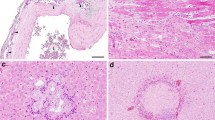Summary
This long-term study deals with the effect of ascorbic acid on chemically induced carcinogenesis of the small intestine in rats. Carcinoma was induced in 27 animals by application of N-Ethyl-N′-nitro-N-nitrosogua-nidine (ENNG) alone in the drinking water (120 mg/1). The average survival time was 238 (± 40) days. The addition of large amounts of ascorbic acid to the food (3 g/100 g food) did not suppress the development of tumors. On the contrary, a significant reduction in the survival time was seen. All animals receiving ENNG and ascorbic acid only lived 207 (± 45) days on average. Neither histological type of tumor spread was influenced by the use of ascorbic acid. Giving ascorbic acid alone had no effect on the survival time and did not lead to changes in the tissue of the small intestine.
Zusammenfassung
Die Studie gilt der Wirkung von Vitamin C auf die chemisch induzierte Dünndarmcarcinogenese der Ratte im Langzeitversuch. Bei 27 Tieren wurde durch alleinige Verabreichung von N-Äthyl-N′-Nitro-N-Nitrosoguanidin (ÄNNG) im Trinkwasser (120 mg/1) eine Tumorentwicklung induziert, die eine durchschnittliche Überlebenszeit von 238 (± 40) Tagen bedingt. Die zusätzliche orale Verabreichung von großen Mengen Natriumascorbat (3 g/100 g Futter) kann diese Tumorinduktion nicht verhindern; sie bewirkt sogar eine signifikante Verkürzung der Überlebenszeit. 27 Tiere, die ÄNNG und Vitamin C erhielten, überleben durchschnittlich nur 207 (± 45) Tage. Ebensowenig werden der histologische Tumortyp und die Tumorausbreitung durch die prophylaktische Vitamin C-Gabe beeinflußt. Die alleinige Verabreichung von Ascorbinsäure beeinflußt die Lebensspanne der Versuchstiere nicht und erzeugt keine Dünndarmveränderungen.
Similar content being viewed by others
Literatur
Abul-Hajj YJ, Kelliher M (1982) Failure of ascorbic acid to inhibit growth of transplantable and dimethylbenzantrazene induced rat mammary tumors. Cancer Lett 17:63–67
Ames BN (1983) Dietary carcinogens and anticarcinogens. Science 221:1256–1264
Cameron E, Pauling L (1976) Supplemental ascorbate in the supportive treatment of cancer: Prolongation of survival times in terminal human cancer. Proc Natl Acad Sci USA 73:3685–3689
Cameron I, Grubbs B, Rogers W (1979) High-dose methylprednisolone, vitamin A and vitamin C in rats bearing the rapidly growing Morris 7777 hepatoma. Cancer Treat Rep 63:477–483
Creagan E, Moertel C, O'Fallon J, Schutt A, O'Connel M, Rubin J, Frytak S (1979) Failure of high-dose vitamin C (ascorbic acid) therapy to benefit patients with advanced cancer. N Engl J Med 301:687–690
Frazier T, McGinn M (1979) The influence of magnesium, calcium and vitamin C on tumor growth in mice with breast cancer. J Surg Res 27:318–320
Ivankovic S, Zeller W, Schmähl D, Preussmann R (1973) Verhinderung der pränatal carcinogenen Wirkung von Äthylharnstoff und Nitrit durch Ascorbinsäure. Naturwissenschaften 60:525
Jones FE, Komorowski RA, Condon RE (1984) The effects of ascorbic acid and butylated hydroxyanisole in the chemoprevention of 1,2-dimethylhydrazine-induced large bowel neoplasens. J Surg Oncol 25:54–60
Kawasaki H, Morishige F, Takana H, Kimoto E (1982) Influence of oral supplementation of ascorbate upon the induction of N-methyl-N′-nitro-N-nitrosoguanidine. Cancer Lett 16:57–63
Liso R, Calabrese G, Bitonti MB, Arrigoni O (1984) Relationship between ascorbic acid and cell division. Exp Cell Res 150:314–320
Nagel GA, Schmähl D (1984) Krebsmedikament mit fraglicher Wirksamkeit. In: Nagel GA, Sauer R, Schreiber HW (Hrsg) Aktuelle Onkologie 11. Zuckschwerdt, München
Schlegel J, Pipkin G, Nishimura R, Schultz G (1970) The role of ascorbic acid in the prevention of bladder tumor formation. J Urol 103:155–159
Schmähl D (1975) Zur kausalen Genese maligner Tumoren. Wien Med Wochenschr 125:637–642
Varga JM, Airoldi L (1984) Inhibition of transplantable melanoma tumor development in mice by prophylactic administration of Ca-ascorbate. Life Sci 32:1559–1564
Werner B, Dänzer U, Mitschke H, Brassow F (1981) Vitamin C und Dünndarmkrebs. Eine experimentelle Studie. Langenbecks Arch Chir 354:101–109
Author information
Authors and Affiliations
Rights and permissions
About this article
Cite this article
Werner, B., Hrynyschyn, K. & Schäfer, H. Vitamin C im Langzeitversuch ohne Einfluß auf die experimentelle Carcinogenese. Langenbecks Arch Chiv 363, 185–193 (1985). https://doi.org/10.1007/BF01261292
Received:
Issue Date:
DOI: https://doi.org/10.1007/BF01261292



